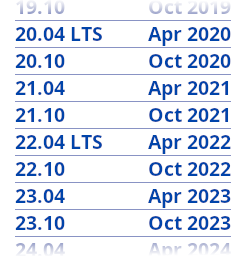
Inhaltsverzeichnis

Xubuntu is an elegant and easy-to-use desktop operating system that comes with the Xfce desktop environment, making it stable, light on resources and configurable.
It is perfect for those who want to make the most of their desktops, laptops and netbooks, featuring a modern look and enough features for efficient daily usage. It also works well on older hardware, single-board computers like the Raspberry Pi, and the Windows Subsystem for Linux (WSL).
Xubuntu was first released in 2006. It is a community-developed project led by the Xubuntu team. The team is made up of volunteers who work on different aspects of the project including design, programming, marketing, testing, website, documentation, and administration.
Find out more at the Xubuntu website or on Wikipedia.
The „X“ in Xubuntu stands for Xfce, the user interface and bundled core applications that come with Xubuntu. The „ubuntu“ in Xubuntu denotes its relationship with the Ubuntu base upon which the operating system is built. Xubuntu is pronounced „zoo-bun-too“.

The word „ubuntu“ represents the philosophical core of the operating system. Ubuntu can be roughly translated as „humanity towards others.“ To read more about the philosophy and ideals behind Ubuntu and Xubuntu, please refer to the Ubuntu Philosophy page.

Xubuntu produces a new Long Term Support (LTS) release every 2 years. These releases are supported for 3 years and are a popular choice for users that prefer stability over new features. Every 6 months, a new interim release is made available for users who want to use the latest features at the cost of a shorter, 9-month support cycle. New releases are produced every April and October.
Xubuntu follows the Ubuntu version numbering scheme, which is based on the distribution release date. The first part of the release denotes the year, while the second part denotes the month. For example, the first official Xubuntu version was released in June, 2006, thus its version number was 6.06.
There are two editions of Xubuntu: Xubuntu Desktop and Xubuntu Core. Xubuntu Desktop targets the regular user and comes with a collection of preinstalled software carefully curated by the Xubuntu team. It includes a suite of tools appropriate for most tasks, from image and document editing to web browsing and more.
Xubuntu Core is a slimmed-down edition of Xubuntu Desktop, with apps just for the basic tasks, such as file management and terminal emulation. This results in a smaller download ISO, with fewer preinstalled plugins and libraries, that will be even lighter on resources. This edition is targeting users who want to install just the apps they want to suit their specific needs from a cleaner base, so they can create their own custom OS.

The Xubuntu project is entirely committed to the principles of free software development where people are encouraged to use software that protects their freedoms, view its source code, improve it, and pass it on. You can find out more about free software and the ideological and technical philosophy behind it at the GNU website.

Linux was brought to life in 1991 by a Finnish student named Linus Torvalds. At the heart of the Xubuntu operating system lies the Linux kernel. The kernel is an important part of any operating system, providing the communication bridge between hardware and software. Read more about Linux at the Linux kernel website.

Xfce is the lightweight desktop environment used in Xubuntu. It aims to be fast and low on system resources, while still being visually appealing and user friendly. Xfce embodies the traditional UNIX philosophy of modularity and reusability. Read more about Xfce at the Xfce website.
Xubuntu is built on the hard work of the Debian and Ubuntu GNU/Linux distributions. Based on Ubuntu, Xubuntu supports a wide variety of hardware and provides access to a large archive of free and open source software. Much of this software, including the packages that compose the Xfce desktop environment, are made available by the Debian Xfce team.